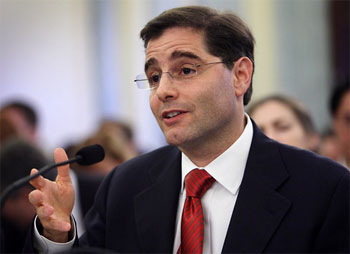FCC Proposes Rules On Internet Access

The chairman of the Federal Communications Commission outlined a plan on Thursday that would allow the agency to control the transmission component of high-speed Internet, but not rates or content.
In announcing the F.C.C. decision, Julius Genachowski, the commission’s chairman, said the agency would begin a process to reclassify broadband transmission service as a telecommunications service, subjecting the Internet to some of the same oversight as telephone services.
But, he said, the commission would also exempt broadband service from many of the rules affecting telephone service, seeking mainly to guarantee that Internet service providers could not discriminate against certain applications, Internet sites or users.
The approach would specifically forbid the commission from regulating rates charged by telephone and cable companies for Internet service and would not allow the commission to regulate Internet content, services, applications or electronic commerce sites.
The approach, Mr. Genachowski said, maintains the “status quo” and is intended to be “consistent with the longstanding consensus regarding the limited but essential role that the government should play with respect to broadband communications.”
Opponents, including some telecommunications companies that provide broadband Internet service, said the approach would create uncertainty and legal battles that would slow the development of technologies that could benefit consumers.
They also said that in making the legal justification for its decision, the commission seemed to be arguing the opposite of what it had previously asserted in a Supreme Court case on Internet regulation.
The new regulatory framework was made necessary, Mr. Genachowski said, by a federal appeals court decision last month involving Comcast, the nation’s largest cable company, that invalidated the approach that the F.C.C. had taken to regulating broadband service.
Under that approach, the commission maintained that it had “ancillary authority” to oversee certain aspects of broadband service even though it did not fall under the strict rules that give the commission the power to regulate telephone service.
The United States Court of Appeals for the District of Columbia Circuit said in April that the F.C.C.’s classification of broadband service as an “information service” rather than as a “telecommunications service” did not allow it to sanction Comcast for slowing or blocking access by its customers to an application known as BitTorrent, which is used to share large data files including video and audio.
The new approach, which the F.C.C. called a “third way,” would rely on a legal theory that recognizes the computing function and the broadband transmission component of retail Internet access service as separate things subject to different regulation.
The approach is similar to one that the commission has used to regulate aspects of wireless communications service, Mr. Genachowski said. And it relies in part on a 2005 United States Supreme Court decision, National Cable and Telecommunications Association v. Brand X Internet Services. In that case, the court said that Congress gave the F.C.C. the authority to decide how it would regulate Internet service.
But the F.C.C.’s new approach also relies in part on a dissenting opinion in that case, written by Justice Antonin Scalia, which said that the “computing functionality” and the broadband transmission component of Internet access service were different things, each subject to differing levels of regulation.
Austin C. Schlick, general counsel for the F.C.C., said in a statement that “the upshot is that the commission is able to tailor the requirements” of its regulatory authority “so that they conform precisely to the policy consensus for broadband transmission services.”
Telecommunications companies said they believed the F.C.C. had overstepped. The National Cable and Telecommunications Association, with whom the F.C.C. sided in the Brand X case, called the decision “fraught with legal uncertainty and practical consequences which pose real risks to our ability to provide the high-quality and innovative services that our customers expect.”
Thomas J. Tauke, an executive vice president at Verizon, said the new approach was “legally unsupported” and could only bring “confusion and delay to the important work of continuing to build the nation’s broadband future.”
Part of the uncertainty, opponents said, would result from the possibility that future F.C.C. leaders could decide that they wanted to reverse the decision, just as Mr. Genachowski reversed a previous commission’s ruling.
Consumer advocates praised the decision, at least in part. Public Knowledge, a consumer interest group, said it supported the approach but was dismayed by the commission’s decision that “open access” provisions of the Communications Act — which require companies to share access to the physical lines of connection that enter consumers’ homes — did not apply to broadband access as they did to basic telephone service.
Joel Kelsey, a policy analyst for Consumers Union, said the F.C.C. “appears to have found a way to ensure it has the authority to protect consumers from potential anticompetitive actions by providers of broadband services.”
Comcast, which successfully fought the commission over its regulatory authority, said in a statement that it was prepared “to work constructively” with the F.C.C. on “limited but effective measures” to preserve an open Internet, as long as they did not put the industry under a regulatory cloud.





One comment
Trackbacks/Pingbacks